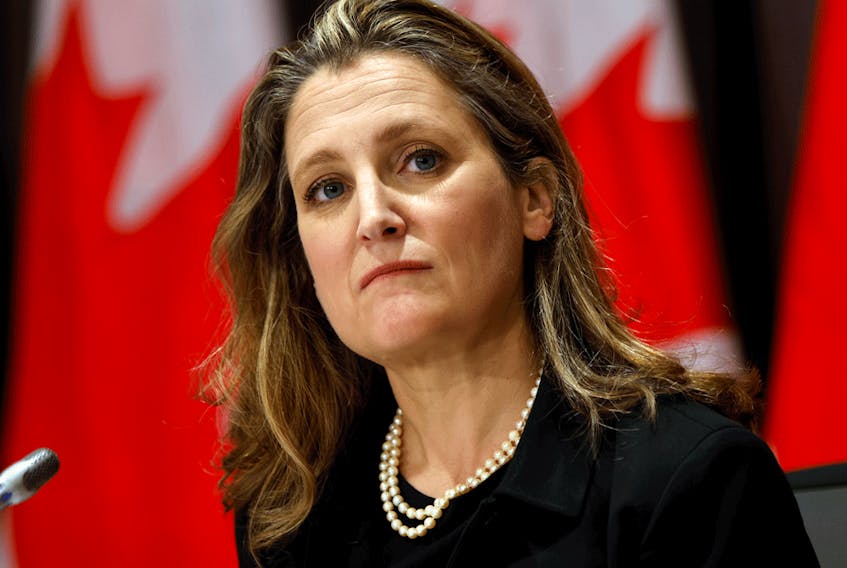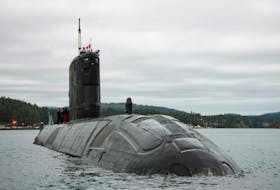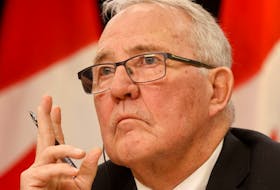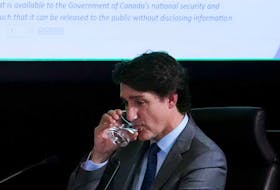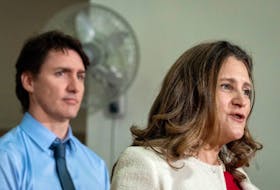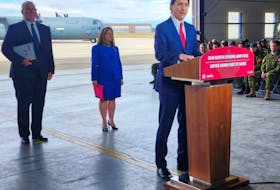Finance Minister Chrystia Freeland is proving to be an enthusiastic practitioner of political sloganeering.
Questioned on the vastness of Liberal borrowing activities, she declared that Canada “can’t afford not to” go deeper into debt to fight the COVID-19 pandemic. Delivering an address in Toronto last week, she dismissed concerns that Prime Minister Justin Trudeau’s Liberal government is steering the country straight toward a repeat of the 1995 credit crisis, which forced an earlier big-spending Liberal regime to impose steep spending cuts and harsh austerity measures.
“It is a poor general who fights the last war,” she argued, insisting 2020 is nothing like 1995. For good measure, she added another empty pronouncement, declaring that, “Doing too little is more dangerous and potentially more costly than doing too much.”
Slogans may be great for selling headache remedies and antacid pills, and likely please people who need catchy phrases for scribbling on placards, but they’re no way to run a country. You’d think Liberals might have learned that from the disappearance of “sunny ways” from the prime minister’s catalogue of breezy talking points. Apart from their basic shallowness, both Freeland’s assertions have big holes in their logic.
If Canada “can’t afford not to” borrow $350 billion to fight COVID-19, why not double that to $700 billion or $1 trillion? If you believe that debt financing spurs growth, and that today’s low rates are a once-in-a-lifetime opportunity, then it follows that the more you borrow the greater the growth will be. Freeland notes that Ottawa’s debt-servicing costs are less than one per cent of gross domestic product, compared to six per cent in 1995. Great … in that case, current borrowing levels are an affront to a population worthy of much greater indebtedness than a measly one-third of a trillion.
As to Freeland’s allusion to generalship, it’s equally empty. In essence, it’s an argument that we have nothing to learn from the past, that experience means little if anything in dealing with today’s financial realities. Which is just daffy. The 1995 crisis occurred because too many governments ignored warnings about the dangers of debt for too long, and were left unprepared when the crunch finally came.
Canada is not immune to economic realities. Borrowing rates may be low now, and the economy large enough to handle an increase, but there’s no guarantee those conditions will remain unchanged forever. Many a corporate giant has collapsed in rubble when future financial developments didn’t work out as expected. Talk to the smart minds at Boeing, Hertz, JC Penney or anyone in the oil industry, if you think smart minds like Freeland’s can predictably spot what’s coming down the turnpike.
The finance minister takes care to assure us she is not all spend and no preparation. There is a plan. “We have a compass. We know how to get to a safe harbour and what to do when we get there,” she said. Unfortunately, she just won’t tell us the details. Maybe it’s a secret harbour. Maybe she’s afraid someone else will get there first. In any case, Canadians can’t be told the whereabouts. You’ll just have to trust Chrystia Freeland and Justin Trudeau.
That’s asking a lot. This has not been the most surefooted of governments. It has jettisoned every important fiscal target it set for itself, starting with the famous pledge to limit deficits to three years at $10 billion a year. COVID-19 can’t be blamed for the backsliding, which began long before the pandemic came along and showed no sign of slowing under former finance minister Bill Morneau, whose departure was credited, at least in part, to his reluctance to oversee a continued binge of the type the prime minister favours.
There hasn’t been a federal budget since March 2019, and we don’t know when the next one will be. Freeland told last week’s forum that Ottawa will deal with the debt and deficits that have ballooned since last March, but not how or when. The only thing we know for sure is that both she and the prime minister feel it’s too soon to worry about issues like that; that continuing to pour money into the economy to battle the virus trumps every other concern, including the future, for now.
Having blown through previous “fiscal anchors” — i.e., targets to use in controlling spending — Freeland won’t bother setting new ones.
“Our economy will only be able to recover fully once we have defeated the virus,” she said , which is another catchy phrase that’s better suited to photo ops than sound planning. Since when is Canada incapable of walking and chewing gum at the same time? Any capable business operator knows that mortgaging the future is no way to deal with the present, no matter how challenging the present may be. It’s not a question of simply turning off the taps, as Liberals would have us believe is the only alternative. It’s a question of controlling the taps so the economy and the treasury aren’t bone dry when the outpouring is over.
Freeland is still new to her job and lacks the depth of background usually expected of finance ministers. She has shown herself to be a skilled politician and a fast learner. She would do better to listen harder to the voices preaching caution and preparedness, rather than her boss’s view that everything needs to go overboard to save the ship. Canada’s ship isn’t that endangered yet, and doesn’t need to be rebuilt. It could still be run aground by poor captaincy, though.
National Post
Twitter.com/kellymcparland
Copyright Postmedia Network Inc., 2020

